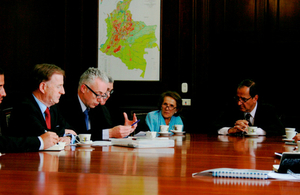Helping Colombians displaced from their land
Read about our International Unit's visit to Colombia and the recommendations they made to the Colombian registration authority.

Helping Colombians displaced from their land
More than five million Colombians were forced to leave their homes through armed conflict. The plight of these ‘internally displaced persons’ (IDPs) has been described by a Colombian Government agency as ‘one of the most severe chronic humanitarian crises in the world.’
Returning the land to these people became an urgent priority and in May 2009, the British Embassy in Bogotá invited us to review the situation and lend our support. We visited Bogotá to investigate the Colombian conveyancing and registration processes and provide recommendations to the registration authority, the Superintendencia de Notariado y Registro (SNR), on a number of registration-related projects.
Our initial report included sections on the remote registry offices and the problems associated for IDPs and indigenous people.
Later that year we produced a follow-up report about improving procedures for protecting the property rights of IDPs.
From 2011 to 2012, we re-visited Colombia to carry out further work on land registration, in view of the anticipated passing of legislation to restore land seized by armed groups - the Victims’ Law. The restitution process under the new law involved not only restoring possession, but also registering the owner’s title if it’s not already registered and in some cases registering the occupier as the owner.
As part of this work, we advised on ways for the SNR to manage increased work as a result of the new law and provided recommendations to increase registration in rural areas, where almost half of the properties identified by the state had not been registered. The recommendations included:
- booklets with simple explanations on why ownership should be registered and how this is done
- increasing the presence of SNR around the country by using remote municipal offices
- avoiding unnecessary bureaucracy such as a local land registrar ‘signing off’ every registration.
We also advised that implementing our recommendations should encourage a change in the ‘mindset’ of officials so they become less ‘risk averse’ and more focused on the interests and convenience of the citizen.
During our most recent visit in 2012, a positive change in officials was already visible. There was a real appreciation of the Colombian Government’s commitment to land restitution and formalising ownership and other government institutions’ obligation to help bring this about.